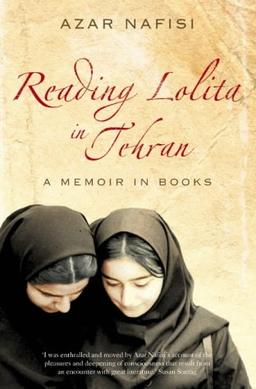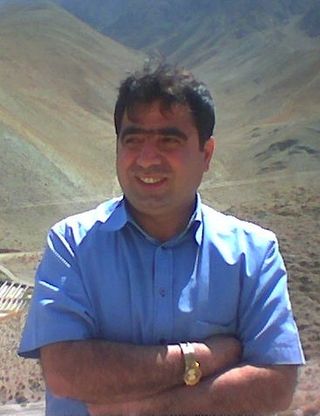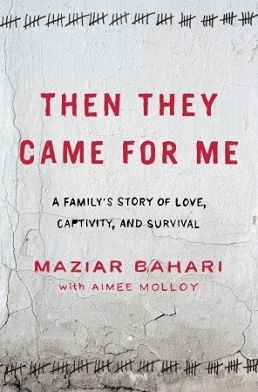
Zahra "Ziba" Kazemi-Ahmadabadi was an Iranian-Canadian freelance photojournalist. She gained notoriety for her arrest in Iran and the circumstances in which she was held by Iranian authorities, in whose custody she was killed. Kazemi's autopsy report revealed that she had been raped and tortured by Iranian officials while she was at Evin Prison, located within the capital city of Tehran.

Evin Prison is a prison located in the Evin neighborhood of Tehran, Iran. The prison has been the primary site for the housing of Iran's political prisoners since 1972, before and after the Islamic Revolution, in a purpose-built wing nicknamed "Evin University" due to the number of students and intellectuals housed there. Evin Prison has been accused of committing "serious human rights abuses" against its political dissidents and critics of the government.

Sayyid Assadollah Ladjevardi was an Iranian conservative politician, prosecutor and warden. He was one of the officials responsible for the 1988 executions of Iranian political prisoners, and was assassinated by the People's Mujahedin of Iran on 23 August 1998.

The state of human rights in the Islamic Republic of Iran has been criticized by Iranians and international human rights activists, by writers, and NGOs. The United Nations General Assembly and the Human Rights Commission have condemned prior and ongoing abuses in Iran in published critiques and several resolutions. The government is criticized both for restrictions and punishments that follow the Islamic Republic's constitution and law, and for "extrajudicial" actions by state actors, such as the torture, rape, and killing of political prisoners, and the beatings and killings of dissidents and other civilians. Capital punishment in Iran remains a matter of international concern.

Reading Lolita in Tehran: A Memoir in Books is a book by Iranian author and professor Azar Nafisi. Published in 2003, it was on the New York Times bestseller list for over one hundred weeks and has been translated into 32 languages.

Ahmad Batebi is an Iranian activist who was designated a prisoner of conscience by Amnesty International. During his studies at the University of Tehran he gained international fame for his appearance on the July 17, 1999, cover of The Economist magazine, holding up a shirt splattered with the blood of a fellow protester.

Akbar Mohammadi was an Iranian student at Tehran University involved in the 18th of Tir crisis, also known as the July 1999 Iran student protests, Iran's biggest pro-democracy demonstrations since the 1979 Islamic Revolution. He later died at Evin prison, causing an international outcry.
White torture, often referred to as white room torture, is a type of psychological torture technique aimed at complete sensory deprivation and isolation. A prisoner is held in a cell that deprives them of all senses and identity. It is particularly used in Iran; however, there is also evidence of its use by the Venezuelan and the United States intelligence services.

Kianush Sanjari, is an Iranian journalist and activist. He has a history of being arrested, imprisoned, and imprisoned in solitary confinement several times in Iran.
Marina Nemat is the author of two memoirs about her life growing up in Iran, serving time in Evin Prison for speaking out against the Iranian government, escaping a death sentence and finally fleeing Iran to go and live in Canada.
Haleh Esfandiari is an Iranian-American academic and former Director of the Middle East Program at the Woodrow Wilson International Center for Scholars in Washington, D.C. Her areas of expertise include Middle Eastern women's issues, contemporary Iranian intellectual currents and politics, and democratic developments in the Middle East. She was detained in solitary confinement at Evin Prison in Tehran, Iran for more than 110 days from May 8 to August 21, 2007.
Bahareh Hedayat is an Iranian activist and campaigner for women's rights. She was one of the activists who worked on the One Million Signatures campaign to change laws that discriminate against women in Iran. She has been arrested and imprisoned several times.
Zarah Ghahramani is an Iranian-born Kurdish author living in Australia who wrote My Life as a Traitor, an award-winning memoir of her imprisonment and torture in Evin Prison.
Kahrizak Detention Center is a detainment facility operated by the Judicial system of Iran in Kahrizak, Tehran Province, Iran.
Zeynab Jalalian is a Kurdish Iranian who has been convicted a mohareb and sentenced to death by an Islamic Revolutionary Court for allegedly being a member of the Kurdish militant group PJAK, which she denies. Jalalian's sentence was later reduced to life imprisonment.
Human rights organizations have condemned Jalalian's verdict, torture, conditions of incarceration and the inattention to her medical care.

Then They Came for Me: A Family's Story of Love, Captivity, and Survival is a memoir by Iranian Canadian journalist Maziar Bahari with Aimee Molloy, chronicling Bahari's family history, and his arrest and 118-day imprisonment following the controversial 2009 Iran presidential election. It was published by Random House in 2011.

Narges Mohammadi is an Iranian human rights activist and the vice president of the Defenders of Human Rights Center (DHRC), headed by Nobel Peace Prize laureate Shirin Ebadi. In May 2016, she was sentenced in Tehran to 16 years' imprisonment for establishing and running "a human rights movement that campaigns for the abolition of the death penalty". In 2022, she was named in the BBC 100 Women list.
Marzieh Rasouli is an Iranian journalist who writes about culture and the arts for several of Iran's reformist and independent publications. In 2012 the Iranian authorities arrested her and accused her of collaborating with the BBC. In 2014 she was convicted of "spreading propaganda" and "disturbing the public order". Sentenced to two years in prison and 50 lashes, she was taken to Evin prison on July 8, 2014. PEN International called for her "immediate and unconditional" release. Marzieh Rasouli's sentence was reduced on appeal to one year in prison, and on October 19, 2014, she was released from prison.
Golrokh Ebrahimi Iraee or Golrokh Iraee is an Iranian writer, accountant, political prisoner and a human rights defender who advocates against the practice of stoning in Iran. As a religious prisoner of conscience she was represented by Vice Chair of the USCIRF Gayle Manchin.
Kylie Moore-Gilbert is an Australian-British academic in Islamic studies. She was a lecturer at the University of Melbourne's Asia Institute and has carried out research into revolutions in the Middle East, in particular Bahraini politics and protests.











